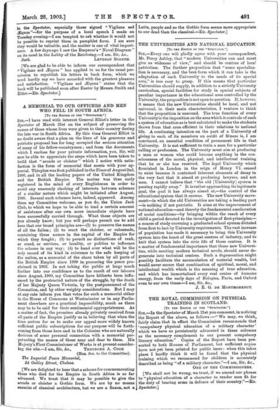THE UNIVERSITIES AND NATIONAL EDUCATION. [To Tits Eorroa or THE
"SPECTATOR."'
SIR,—Every one will gladly agree with your correspondent, Mr. Percy Ashley, that " modern Universities can and must give us wideness of view," and should be centres of loci' patriotism. The further proposition that "some specialisa• tion is necessary, and the best form which it can take is the adaptation of each University to the needs of its special area," is less easy to grasp. If this means that particular Universities should supply, in addition to a strictly University curriculum, special facilities for study in special subjects of peculiar importance in the educational area controlled by the University, the proposition is not open to question. If, however, it means that the new Universities should be local, and not universal, in their main characteristics, I venture to think that the proposition is unsound. The true function of every University is the imposition on the area which it controls of such a system of education as is best calculated to make the students drawn from that area efficient in their relations to national life. A continuing intention on the part of a University of giving to each of its members an outfit of fitness is, I am convinced, an essential condition of permanent life in that University. It is not sufficient to train a man for a particular calling or profession. The University must aim at producing a man or woman who could become anything in the con• sciousness of the moral, physical, and intellectual training that he or she has received. The legal University which flourished in London in the reign of Henry VI. ceased to exist because it contained inherent elements of decay in the very fact that it aimed at producing lawyers, and not men. I cannot believe that "the old [University] system is passing rapidly away." It is rather approaching its legitimate goal, the goal it has always aimed at,—the control of the educational system that it crowns. The new University move- ment—in which the old Universities are taking a leading part is nothing if not patriotic. It aims at the improvement of national education—and thereby the fundamental amelioration of social conditions—by bringing within the reach of every child a period devoted to the investigation of first principlesr- a course of study crowning a graduated school system dictated from first to last by University requirements. The vast increase of population has made it necessary to bring this University system into the heart of the great centres of industry, and to knit that system into the civic life of those centres. It is a matter of fundamental importance that these new Universi- ties, while meeting modern technical needs, should never de- generate into technical centres. Such a degeneration might possibly facilitate the accumulation of material wealth, but would never secure that combination of spiritual, moral, and intellectual wealth which is the meaning of true education, and which has immortalised every real centre of humane energy, from the early days of Bologna, Paris, and Oxford even to our own times.—I am, Sir, 1c., J. E. G. DE MONTMORENCY.










































 Previous page
Previous page